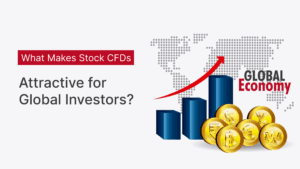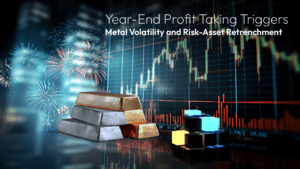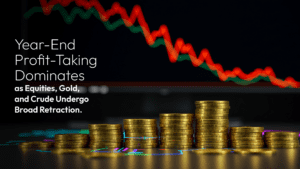In times of market uncertainty, high-net-worth investors often turn to safe-haven assets to preserve their wealth and mitigate risk. Among these assets, precious metals like gold and silver have long been favored for their stability and historical role as a hedge against economic turmoil. In recent years, Contracts for Difference (CFDs) have emerged as a convenient and flexible way to invest in these valuable commodities without the need to purchase the physical metals.
This blog will explore how high-net-worth investors can leverage precious metals CFDs to hedge against market volatility and economic downturns. We’ll delve into the benefits of using gold and silver as hedging instruments, discuss the mechanics of precious metals CFDs, and provide insights on managing risk when trading these contracts.
Understanding Precious Metals as Safe-Haven Assets
Precious metals like gold and silver have historically served as safe-haven assets during periods of economic instability. When stock markets fluctuate, currencies devalue, or geopolitical tensions rise, the value of these metals often remains stable—or even appreciates. This stability is why gold and silver are commonly viewed as a store of value during uncertain times.
Why Are Precious Metals Safe Havens?
- Intrinsic Value: Unlike fiat currencies, which can be devalued by inflation or government policies, precious metals have intrinsic value based on their rarity, industrial use, and historical significance.
- Inflation Hedge: During inflationary periods, precious metals tend to maintain their purchasing power. Investors often turn to gold and silver when inflation erodes the value of paper currencies.
- Portfolio Diversification: Precious metals have a low correlation with traditional asset classes like stocks and bonds, making them an excellent diversification tool in a well-balanced portfolio. This low correlation helps reduce overall portfolio risk during market downturns.
- Liquidity: Precious metals are highly liquid assets, meaning they can be bought and sold quickly, even during volatile market conditions.
Given these advantages, high-net-worth investors often allocate a portion of their portfolio to precious metals as a defensive strategy. And with the availability of precious metals CFDs, this strategy has become even more accessible.
What Are Precious Metals CFDs?
Contracts for Difference (CFDs) are financial derivatives that allow investors to speculate on the price movements of an underlying asset without owning the asset itself. When you trade a precious metal CFD, such as gold or silver, you are essentially entering into a contract with a broker to exchange the difference in the price of the metal from the time the contract is opened to when it is closed.
This means you can profit from both rising and falling markets. If the price of gold or silver rises while you hold a long CFD position, you make a profit. Conversely, if you take a short position and the price of the metal falls, you can also profit from the decline.
The Benefits of Precious Metals CFDs for High-Net-Worth Investors
CFDs offer several advantages over direct investment in physical precious metals. For high-net-worth investors, these advantages include flexibility, leverage, and the ability to hedge portfolios more effectively. Here’s why CFDs are an appealing option:
- Leverage
Precious metals CFDs allow investors to use leverage, meaning they can control larger positions with a relatively small amount of capital. For instance, with 10:1 leverage, an investor can control a $100,000 position in gold with just $10,000. Leverage amplifies potential gains but also increases risk, so it’s essential for investors to use it judiciously.
This feature makes CFDs particularly attractive to high-net-worth investors looking to optimize their capital efficiency. With leverage, they can allocate less capital to a position in precious metals while maintaining exposure to other asset classes.
- Hedging Against Market Volatility
One of the primary reasons investors buy precious metals is to hedge against volatility in other markets, such as stocks or real estate. Precious metals tend to perform well when riskier assets experience downturns, making them a valuable hedge in times of market uncertainty.
By using CFDs, investors can take both long and short positions in gold and silver, depending on market conditions. This flexibility allows them to fine-tune their hedging strategies and react quickly to market developments. For instance, during a sharp stock market selloff, investors might take a long position in gold CFDs to offset potential losses in their equity portfolio.
- No Need for Physical Storage
One of the challenges of investing in physical gold or silver is storage. Precious metals need to be securely stored, whether in a vault or safe, which can be costly and inconvenient. With precious metals CFDs, investors avoid the logistical and financial challenges of storage since they are only speculating on the price movements, not holding the actual asset.
- Lower Transaction Costs
Trading physical gold or silver often involves higher transaction costs, including dealer markups, storage fees, and insurance. In contrast, CFDs generally have lower transaction costs, as they are traded through online platforms with minimal fees. This cost efficiency can be appealing to high-net-worth investors looking to maximize their returns.
- 24/7 Trading
Unlike traditional stock markets with set trading hours, many CFD brokers allow investors to trade precious metals CFDs 24/7. This flexibility is crucial during periods of heightened volatility when prices can fluctuate rapidly due to global events or macroeconomic shifts. High-net-worth investors can take advantage of this around-the-clock trading to manage their positions in response to sudden market developments.
Using Gold and Silver CFDs as Hedging Tools
Gold and silver are the two most popular precious metals used for hedging purposes. Let’s explore how each can be leveraged with CFDs to hedge against market risks.
Gold CFDs: The Ultimate Safe-Haven Hedge
Gold is often considered the ultimate safe-haven asset due to its historical role in preserving wealth during times of crisis. Whether during inflation, currency devaluation, or stock market crashes, gold has consistently held its value.
When to Use Gold CFDs as a Hedge
Gold CFDs can be particularly effective during periods of:
– Economic Uncertainty: When economic indicators point to a recession or slowdown, gold tends to perform well as investors seek safety in stable assets.
– Geopolitical Tensions: Gold prices often rise during geopolitical instability, as it is viewed as a store of value in times of crisis.
– Inflationary Pressure: Gold has a strong track record as an inflation hedge. As inflation erodes the value of fiat currencies, the price of gold typically rises.
By using gold CFDs, investors can quickly open and close positions to hedge their portfolios during periods of volatility. Additionally, the ability to use leverage means investors can take larger positions in gold with less capital outlay.
Silver CFDs: A Versatile Hedging Asset
Silver is another precious metal that has been used as a safe-haven asset, although it tends to be more volatile than gold. Silver’s price is influenced not only by its role as a store of value but also by its industrial applications in electronics, solar panels, and other technologies.
When to Use Silver CFDs as a Hedge
Silver CFDs can be effective hedging tools in the following scenarios:
– Market Corrections: Silver often benefits during equity market corrections, providing a buffer against losses in riskier assets.
– Rising Industrial Demand: Silver’s industrial demand, particularly in technology and renewable energy, can boost its price, making it a valuable hedge during periods of economic recovery.
– Currency Devaluation: Like gold, silver can hedge against currency devaluation, particularly in emerging markets where currency fluctuations are more pronounced.
Silver CFDs are well-suited for high-net-worth investors looking for a more versatile hedging tool. The metal’s price tends to be more volatile than gold, offering potentially higher returns but also greater risks. Investors should carefully manage leverage when trading silver CFDs to avoid magnifying losses during periods of high volatility.
Managing Risk When Trading Precious Metals CFDs
While precious metals CFDs offer numerous advantages, it’s important for high-net-worth investors to manage risk carefully. Here are some key strategies for doing so:
- Set Stop-Loss Orders
A stop-loss order automatically closes a position when it reaches a specified price, helping to limit potential losses. Given the volatility of precious metals markets, setting stop-loss orders is crucial to prevent excessive drawdowns.
- Use Leverage Prudently
While leverage can enhance returns, it also amplifies losses. High-net-worth investors should use leverage conservatively, especially when trading in volatile markets like gold and silver. Limiting leverage ensures that a single adverse market move doesn’t wipe out a significant portion of their capital.
- Diversify Across Asset Classes
While precious metals provide an excellent hedge, it’s important to diversify across different asset classes to further mitigate risk. High-net-worth investors should consider complementing their precious metals positions with assets like equities, bonds, and real estate to create a balanced and resilient portfolio.
Conclusion: A Smart Hedge in Uncertain Times
In an era of heightened economic uncertainty, precious metals remain a reliable hedge against market volatility, inflation, and geopolitical risks. By leveraging precious metals CFDs, high-net-worth investors can gain flexible, cost-effective exposure to gold and silver without the need for physical ownership or storage.
With the added benefits of leverage, lower transaction costs, and 24/7 trading, precious metals CFDs provide a dynamic way to hedge portfolios and protect wealth during turbulent times. For high-net-worth investors seeking stability in uncertain markets, gold and silver CFDs offer an appealing and efficient alternative to traditional investment strategies.





